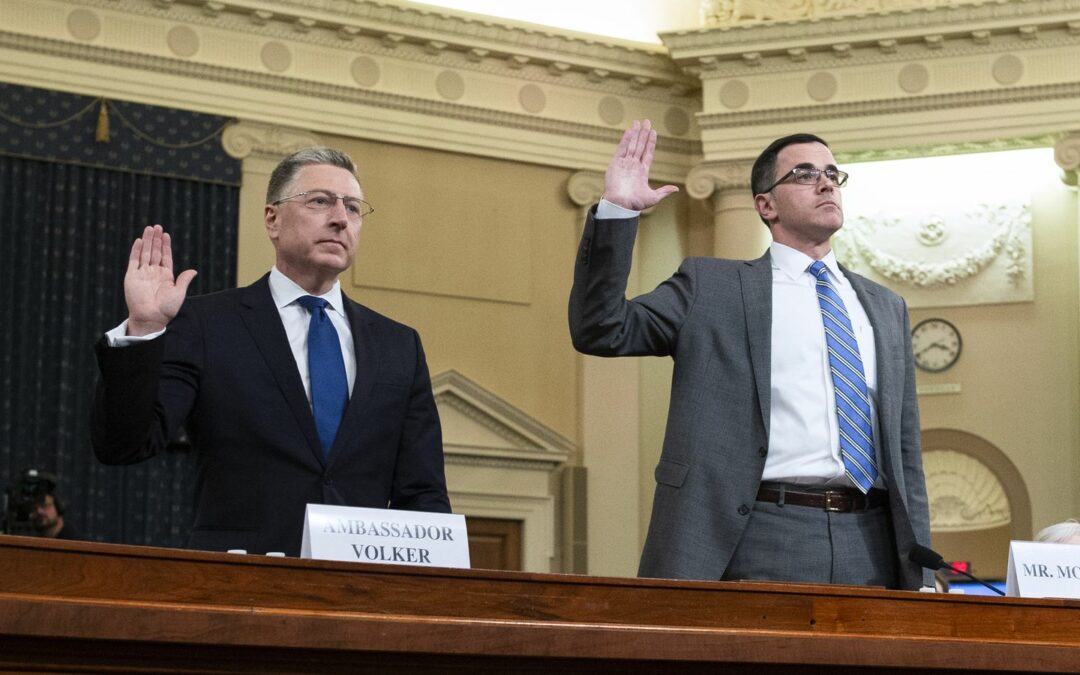Former U.S. special envoy to Ukraine Kurt Volker and former National Security Council Russia adviser Tim Morrison — two witnesses called by Republicans — testified this afternoon in the second public impeachment hearing of the day.
Volker was part of a cadre of officials who worked with Rudy Giuliani to push Ukraine to announce investigations into Trump’s political rivals, though he testified today that he was not aware that the investigation would involve Joe Biden.
Morrison testified that EU Ambassador Gordon Sondland informed him that nearly $400 million in military aid to Ukraine would be released if Ukrainian President Volodymyr Zelensky announced the investigations.
In his opening statement, Volker testified that he did not understand until recently that a proposed Ukrainian investigation of the gas company Burisma — where Hunter Biden formerly served on the board — was equivalent to an investigation of the Bidens.
He added that if he had known that was the case, he would have raised objections.
Volker testified that allegations by Ukraine’s former prosecutor general against Joe Biden and former U.S. Ambassador to Ukraine Marie Yovanovitch are baseless, and that he knows both to be honorable people.
Volker also said in his opening statement that he was not aware of a linkage between military aid and Zelensky’s announcement of investigations, and that he opposed the hold on security assistance.
He said that he warned Zelensky that Rudy Giuliani was negatively influencing Trump’s view of Ukraine.
In a major change from his closed-door testimony, Volker said that Sondland raised “investigations” in a meeting with Ukrainian officials in the White House, and that he and others present thought it was inappropriate.
Volker said that it would be appropriate to ask Ukraine to investigate the 2016 election and Burisma, but that the meeting at the White House was not the right time or place for Sondland to do so.
Morrison testified that Sondland informed him on Sept. 7 that a hold on Ukraine military aid would be released if Zelensky announced investigations into Biden and the 2016 election.
Morrison stated that he got a “sinking feeling” and reported his concerns to then-national security adviser John Bolton, who told him to notify White House lawyers.
Morrison also testified that his predecessor warned him about the “Gordon problem,” referring to Gordon Sondland, and that he responded by tracking Sondland’s efforts in the context of Ukraine without necessarily participating in or endorsing them.
“I decided to keep track of what Ambassador Sondland was doing. I didn’t always act on things Gordon suggested, that he believed were important,” Morrison told lawmakers.
In response to questioning by Rep. Joaquin Castro (D-Tex.), both Morrison and Volker said they believe it’s inappropriate for a U.S. president to ask a foreign country to investigate an American citizen.
The exchange marked the clearest instance of the officials denouncing such a move.
“I don’t believe it is appropriate for the president to do that,” Volker said. “If we have law enforcement concerns with a U.S. citizen generally, there are appropriate channels for that.”
“I agree with Ambassador Paul Volker,” Morrison said.
Lt. Col. Alexander Vindman, the National Security Council’s top Ukraine expert, and Jennifer Williams, an aide to Vice President Pence, also testified this morning.
The hearing was the first time the public heard directly from witnesses who listened to the July 25 call between Trump and Ukrainian President Volodymyr Zelensky that lies at the heart of the impeachment inquiry.
Reflecting their closed-door testimonies, Vindman and Williams both used their opening statements to say that they found the July call to be “improper” and “unusual,” respectively.
House Intelligence Committee Chairman Adam Schiff (D-Calif.) asked Williams about a Sept. 18 call between Pence and Zelensky.
Williams said she was on the call, but her counsel said the call is classified and that she can’t talk about it in an open setting.
Both Vindman and Williams testified that they are not aware of evidence suggesting misconduct by Joe Biden in Ukraine.
Vindman testified that two “substantive” phrases were omitted from the July 25 call, but that he did not believe there was anything nefarious about the omissions.
Vindman refused to answer a line of questioning from ranking member Rep. Devin Nunes (R-Calif.) regarding the officials with whom he discussed the July 25 call due to committee rules protecting the identity of the whistleblower.
GOP counsel Steve Castor asked Vindman at length about an offer to become Ukraine’s defense minister, which he called “rather comical.” Vindman has faced unsubstantiated cable news attacks questioning his loyalty to the U.S. because he was born in Ukraine.
Vindman and Williams, who have both been attacked by the president on Twitter, said they would not describe themselves as “Never Trumpers.”
Schiff delivered a scathing critique of Republicans in his closing statement, arguing that Trump’s allies are angry not that the president engaged in alleged wrongdoing, but that he got caught.
“Now, my Republican colleagues, all they seem to be upset about with this is not that the president sought an investigation of his political rival, not that he withheld a White House meeting and $400 million in aid,” Schiff said.
He continued: “Their objection is that someone blew the whistle, and they would like this whistleblower identified, and the president wants this whistleblower punished. That’s their objection. Not that the president engaged in this conduct, but that he got caught.”
Before Schiff spoke, the top Republican on the panel, Rep. Devin Nunes (Calif.), reiterated several of the points he made in his opening statement opposing to the way Democrats have conducted the impeachment inquiry.
“Good night, see you in the morning,” Nunes said.
